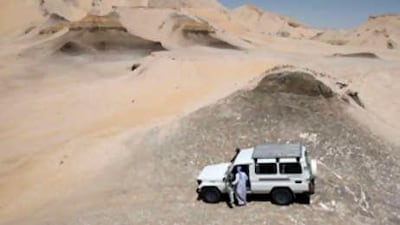CAIRO // Sudan said yesterday the 19 tourists and Egyptians abducted in southern Egypt on Friday had been located but that no action would be taken that could endanger the lives of the hostages. Boutros Sadiq, undersecretary at the Sudanese foreign ministry, said the group had been taken to an area of no-man's land between the Sudanese, Libyan and Egyptian borders, known as Jebel Uweinat.
Zoheir Garana, the Egyptian tourism minister, said the hostages were in good health. "We have very sure and reliable information that everyone is fine; they are in very good health and they have enough food and water. They have not been badly treated," he said. Both Egyptian and Sudanese officials said they would not stage any rescue operation that might endanger the lives of the captives. "From our point of view the security of the hostages is the absolute priority - we do not want an operation that harms hostages," Mr Sadiq said.
Earlier yesterday, Reuters quoted an unnamed Egyptian official as saying the kidnappers have threatened to kill the hostages if attempts are made to rescue them by plane. The official, who spoke on condition of anonymity, said the kidnapped tour operator contacted his German wife via satellite phone and told her of the threat, which she reported to Egyptian authorities. However, Mr Garana dismissed reports of death threats.
"Unfortunately there have been so many rumours. One of them is [a death threat] in case of security officials trying to rescue the hostages. We never received any threats whatsoever." Ali Youssef, a spokesman for the Sudanese foreign ministry, said an Egyptian intelligence team had arrived in Sudan in connection with the abduction. Unnamed Egyptian officials said Germany was conducting negotiations with the kidnappers. Mr Youssef said the identity of the kidnappers was unknown, though Al Jazeera television quoted an Egyptian official as saying the captors were likely from Chad.
"The two governments of Sudan and Egypt agree that the top priority is the safety of the hostages," Mr Youssef said. Security sources said on Monday the kidnappers were asking for ?6 million (Dh32.4m) to free the hostages. The kidnappers abducted the group of 19 - which includes five Italians, five Germans, a Romanian and eight Egyptians - on Friday while they were on an adventure safari in south-western Egypt.
The tour had begun on Sept 16 and was scheduled to end on Saturday in Gilf el Kebir, which borders Libya and Sudan. The eight Egyptians in the group were guides, drivers and at least one security guard - whose presence is required in trips to the area. Few visitors make the trek to Gilf el Kebir, located about 885km south-west of Cairo and separated from the rest of Egypt by a vast plain of dunes known as the Great Sand Sea. It is one of the most arid places on Earth.
The plateau has become increasingly popular among adventure and ecotourists drawn by the stark landscapes and prehistoric paintings in caves that dot the plateau. They include the Cave of the Swimmers, immortalised in the 1996 movie, The English Patient. The unpopulated region is a crossroads for ethnic African tribesmen - including smugglers - from Libya, Sudan and even Chad. About 160km further south lies Sudan's Darfur region, where near-constant conflicts have given rise to armed bandits notorious for robberies and hijackings.
The latest kidnapping was only discovered because the Egyptian owner of the tour company was able to contact his wife via satellite phone and reports were emerging yesterday that such safari trips had been subjected to robbery before, but were never announced by the government. Mr Garana on Monday described the kidnappers as "bandits" as opposed to "terrorists" and said the they had asked for a ransom. Talks were under way to pay the ransom, he was initially quoted as saying by Mena. Sudanese rebel groups were quick to deny they were holding the tourists.
No group has claimed responsibility for the kidnapping, which analysts said distinguished the act from previous attacks in Egypt. "This incident is the first of its kind in Egypt that targets foreign hostages, as generally terrorists blow up or shoot them," said Ibrahim Eissa, editor of the opposition daily Al Destour. "So asking for ransom is something new for Egypt, which is more alarming and scary than a terrorist attack, as terrorists have a plan and can be dealt with, while such gang groups are new."
Attacks on tourists is a sensitive issue for Egypt, harking back to the mid-1990s when the regime was battling militants who targeted mainly tourists, officials, police officers and Coptic Christians. Most of the attacks occurred in Cairo and southern Egypt. The last major Nile Valley attack, blamed on militants, claimed the lives of 58 foreign tourists in the southern temple city of Luxor in 1997.
Since 2004 there have been a string of attacks on the beach resorts of the Sinai peninsula, which are popular with both tourists and Egyptians. Three major bombings - in Taba in 2004, Sharm el Sheikh in 2005 and Dahab in 2006 - killed 121 people and were blamed on disgruntled Bedouins living in Sinai. These latest kidnappings come at a bad time for Egypt as the country prepares for the autumn and winter tourism seasons, which are concentrated in the south of the country, where the tourists were abducted.
"This operation [the kidnapping] is a big blow to security in Egypt,' said Mr Eissa. "All that we hope for is that Egyptian officials are not going to take this crime lightly, and as an exceptional thing, because it's not." nmagd@thenational.ae * With additional reporting by Agence France-Presse, Reuters and the Associated Press

